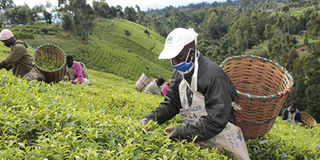Fine-tune reforms to make tea growing worthwhile

Tea picking in Mung'enya, Meru County, on April 30, 2020. PHOTO | FILE | NATION MEDIA GROUP
What you need to know:
- To boost production, revert the farm extension services function to the relevant department of national or county government dealing with agriculture.
- There is need for active stakeholder involvement in these reforms. This will result in a win-win outcome in the tea value chain.
Tea is indisputably one of the leading foreign exchange earners in Kenya.
Recent estimates aver to the fact that tea exports contribute 23 per cent of country’s total foreign exchange earnings. In addition, the tea sub-sector gives well over five million Kenyans a livelihood.
Recent data from the Ministry of Agriculture show that last year, the tea industry earned the country Sh117 billion in export earnings and Sh22 billion in domestic sales.
In terms of supplies, the local sales value also increased from Sh15 billion in 2018 to Sh18 billion last year.
In addition to the regulations for the sub-sector recently announced by Agriculture Cabinet Secretary Peter Munya, there is a need to fine-tune the proposed reforms. This is primarily to buttress key concerns raised by small-scale tea farmers over the years.
First is the critical issue of governance of tea factory companies. The rules governing the election of directors were drawn by the then Kenya Tea Development Authority (KTDA).
Clearly a gerrymandering exercise with no input by farmers, they were designed to lock out directors who championed farmers' interests.
CRITERIA
To address this key concern and chart the way forward, redraw all the boundaries to ensure equitable and fair representation of farmer shareholder representatives based on shareholding, acreage and crop yield or production.
Set minimum qualifications based on education because of the complexity of matters involved in tea governance.
The qualification for a nominee for the position of director should be a university graduate from a recognised institution, besides a threshold in shareholding and acreage production.
Secondly, conduct a forensic audit to determine all payments to farmers over the past 20 years. In addition, track and verify shares held by farmers in current and former factory companies where they delivered their produce.
Thirdly, to increase farmers' earnings, ensure that 70 per cent of the tea exported is in value-added form.
In this regard, benchmark with top tea producers locally in the large-scale tea sector and internationally, such as Sri Lanka. This would require, among others, examining how their tea brands find their way to supermarkets in the West.
RESERVE FUND
Fourthly, establish an online auction where all teas will be sold. Buyers would collect teas from their respective companies.
Explore the establishment of tea trading in derivatives to mitigate price fluctuations, just like with oil.
Fifthly, start a reserve fund for marketing Kenyan tea as a quality global brand. The fund should receive 1.25 per cent of gross sales of all teas.
The drafters can borrow the model of the Tourism Trust Fund, which is used to market Kenya as a tourism destination.
Finally, to boost production, revert the farm extension services function to the relevant department of national or county government dealing with agriculture.
To address the perennial issue of labour shortages, introduce tea plucking machines. The oft-cited compromised quality as a result of mechanisation will be effectively addressed through value addition.
These proposed reforms are, no doubt, the most radical since independence. To ensure they are implemented, only a legally mandated body should oversee the process. To achieve this, establish the Tea Reforms Transition Authority (TRTA).
The authority would, among other key functions, design a structure to replace the current model of the small-scale tea sub-sector under the Kenya Tea Development Agency (KTDA).
Lastly, there is need for active stakeholder involvement in these reforms. This will result in a win-win outcome in the tea value chain, especially for the hardworking tea farmer.
Dr Gitu, a policy and strategy adviser, is a registered small-scale tea farmer and shareholder. [email protected].




